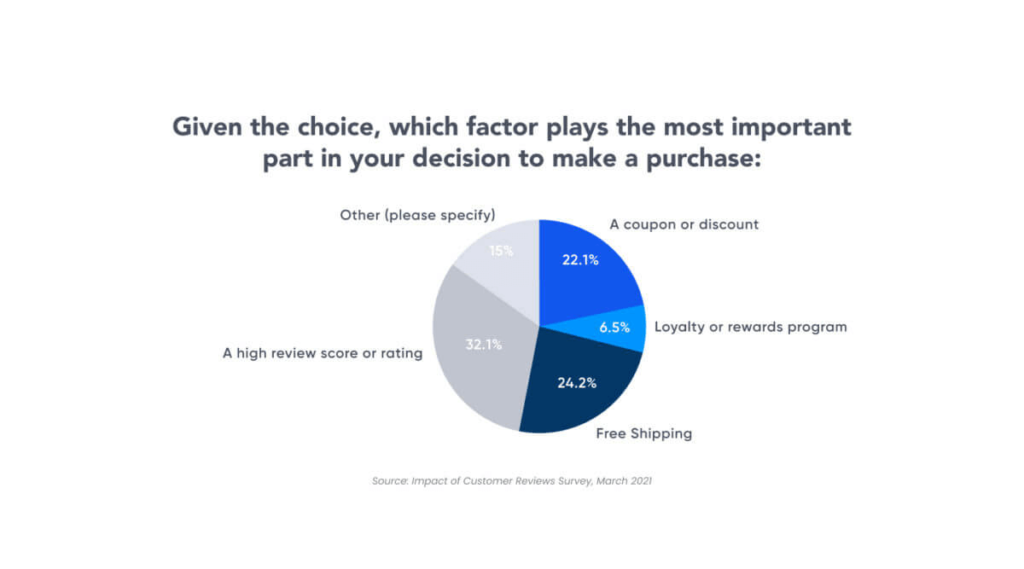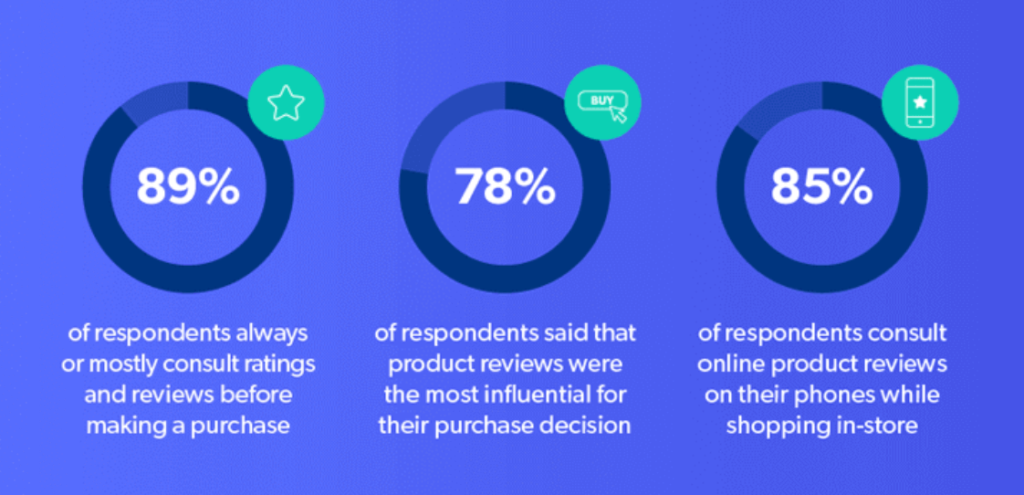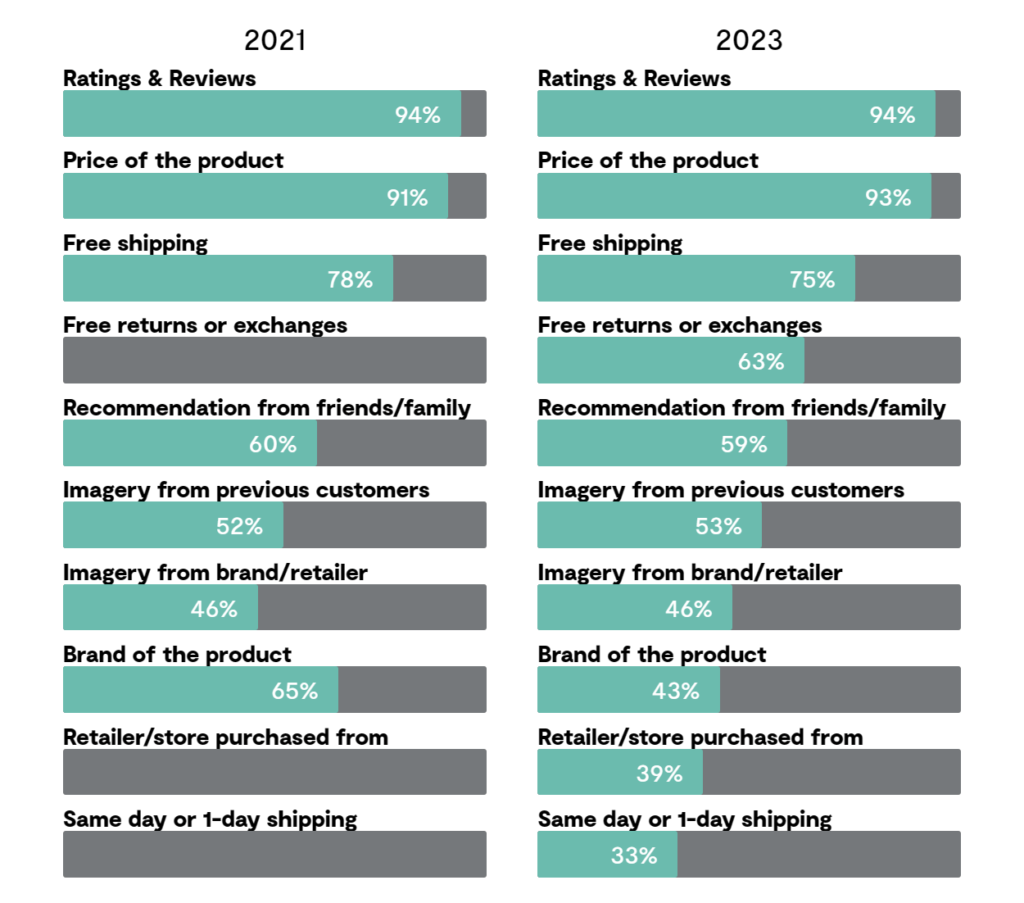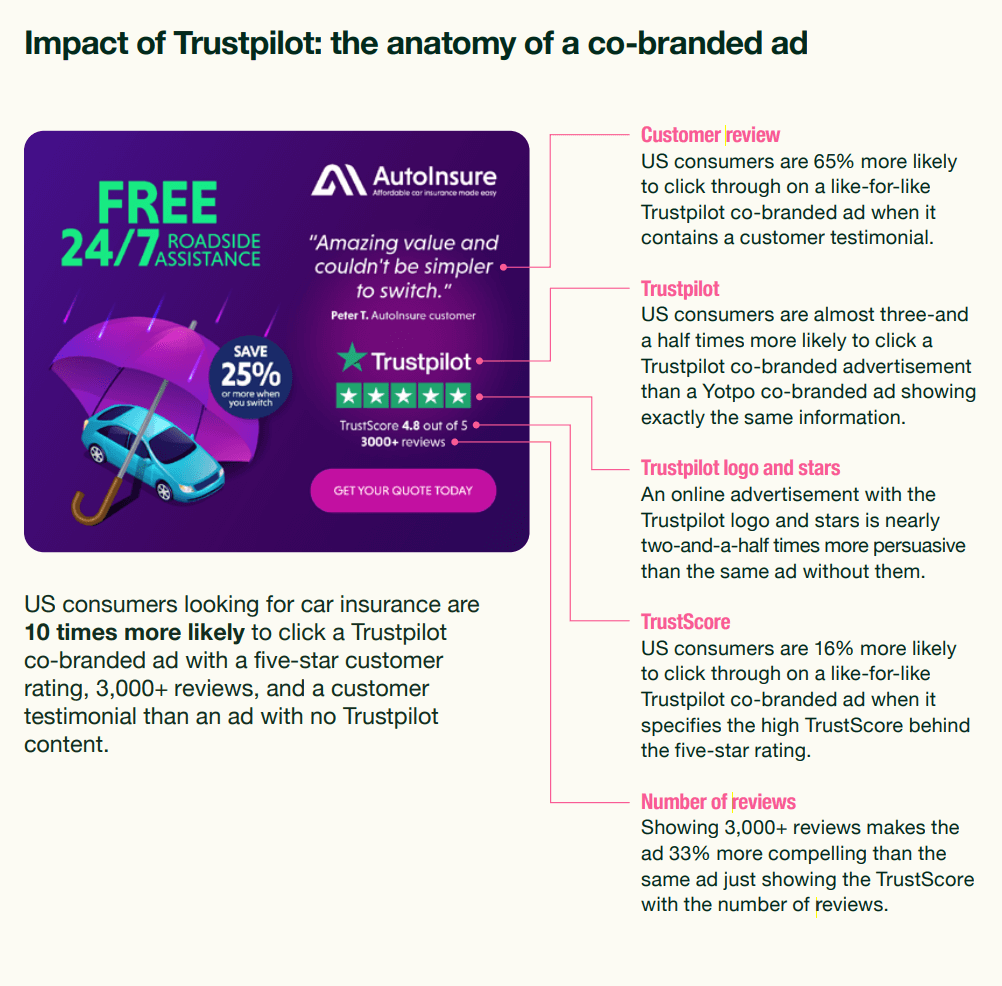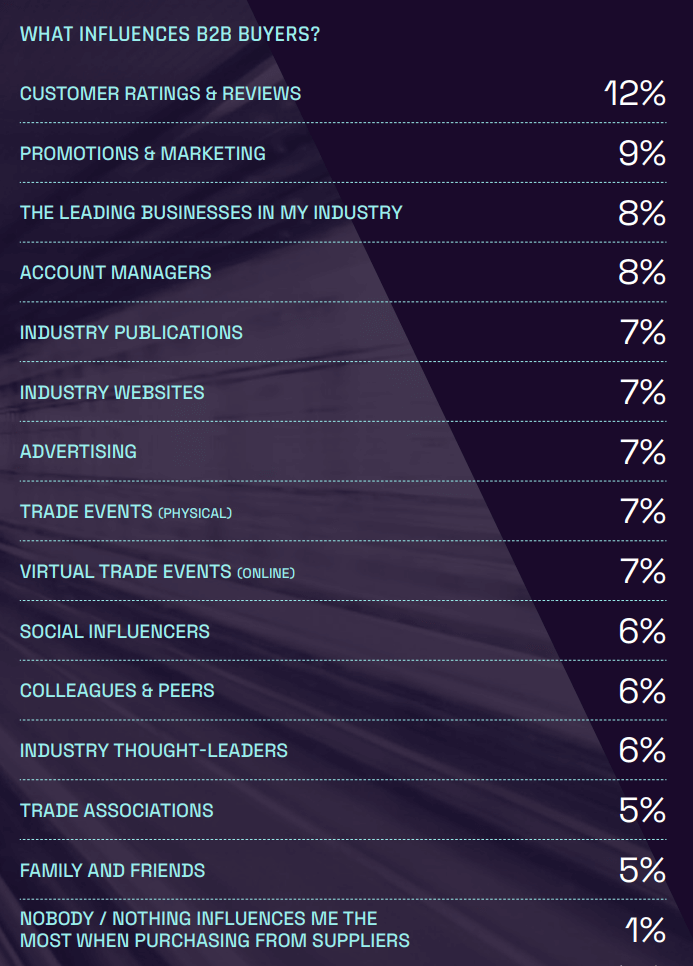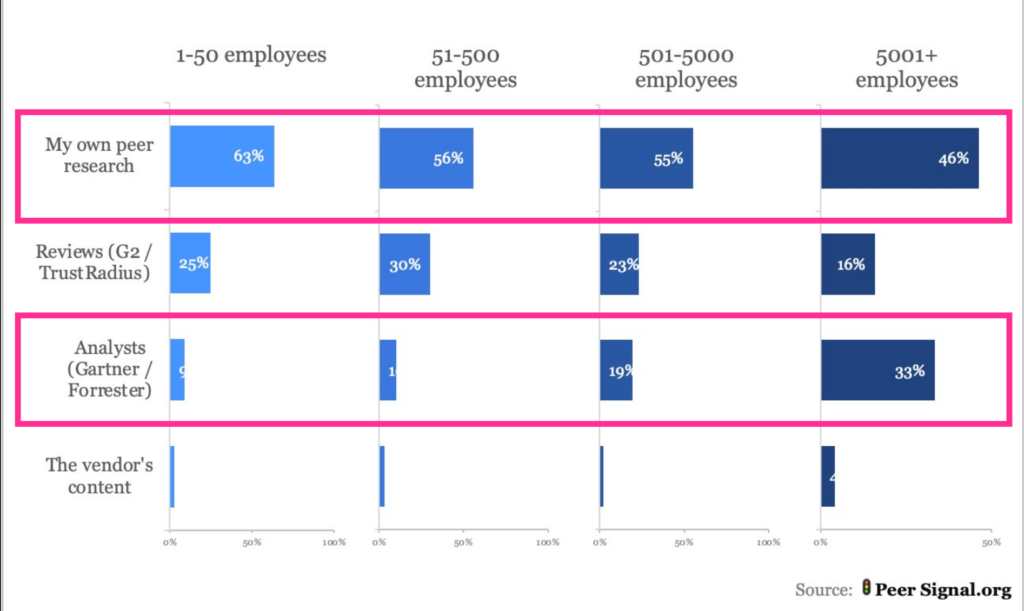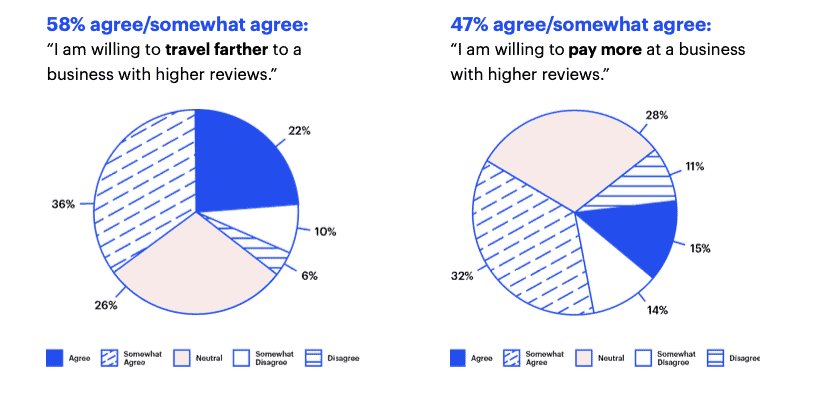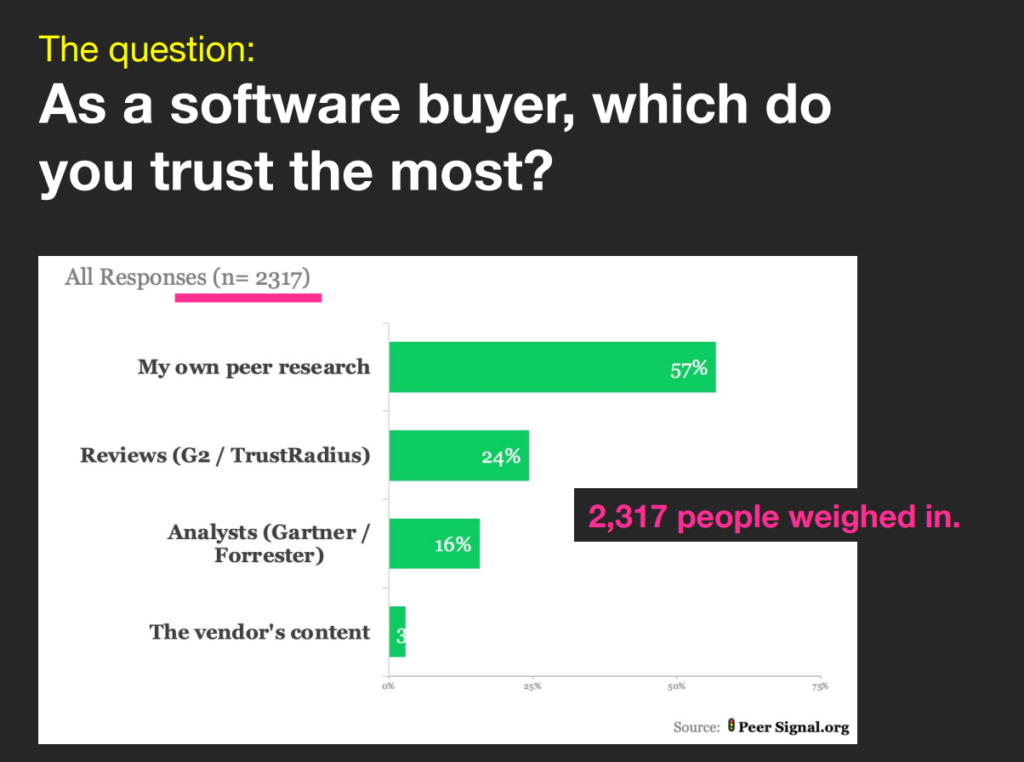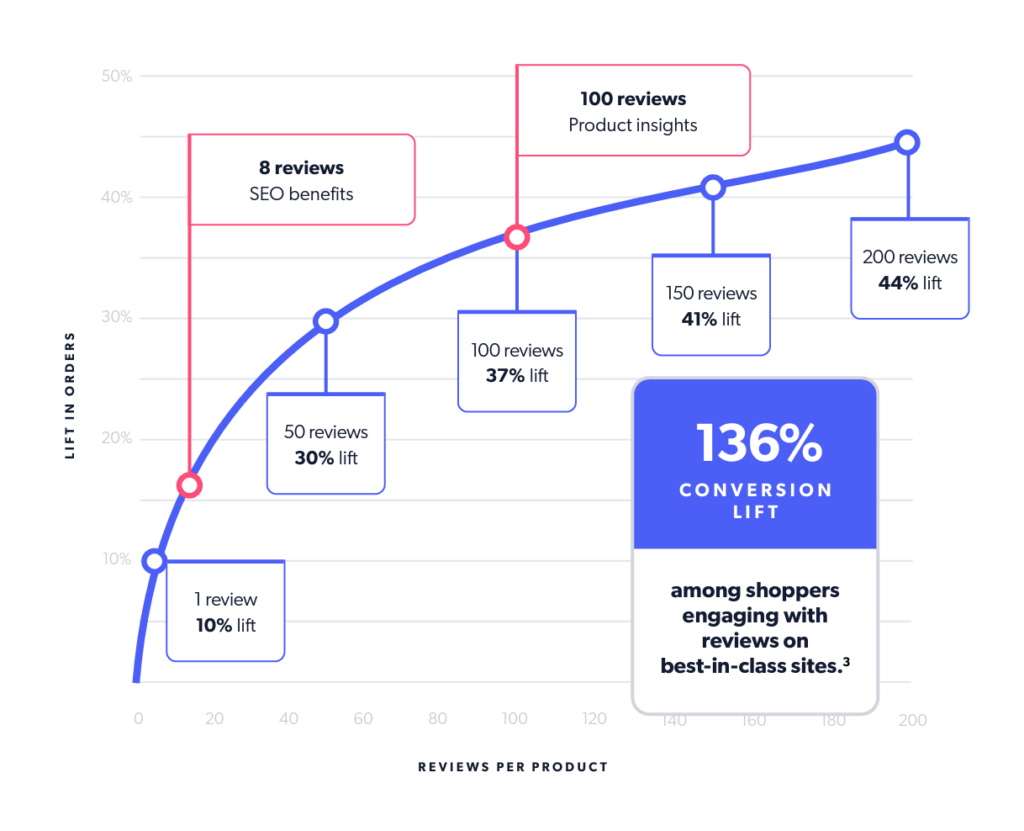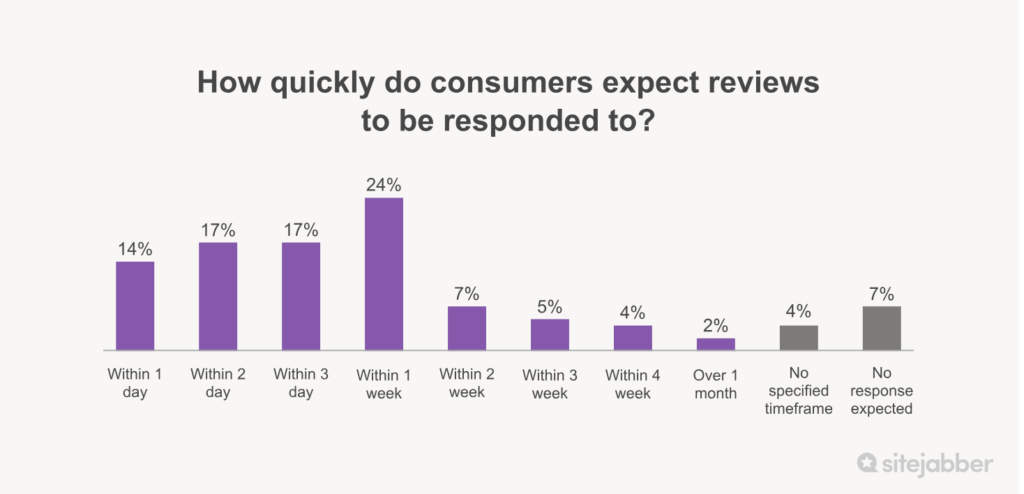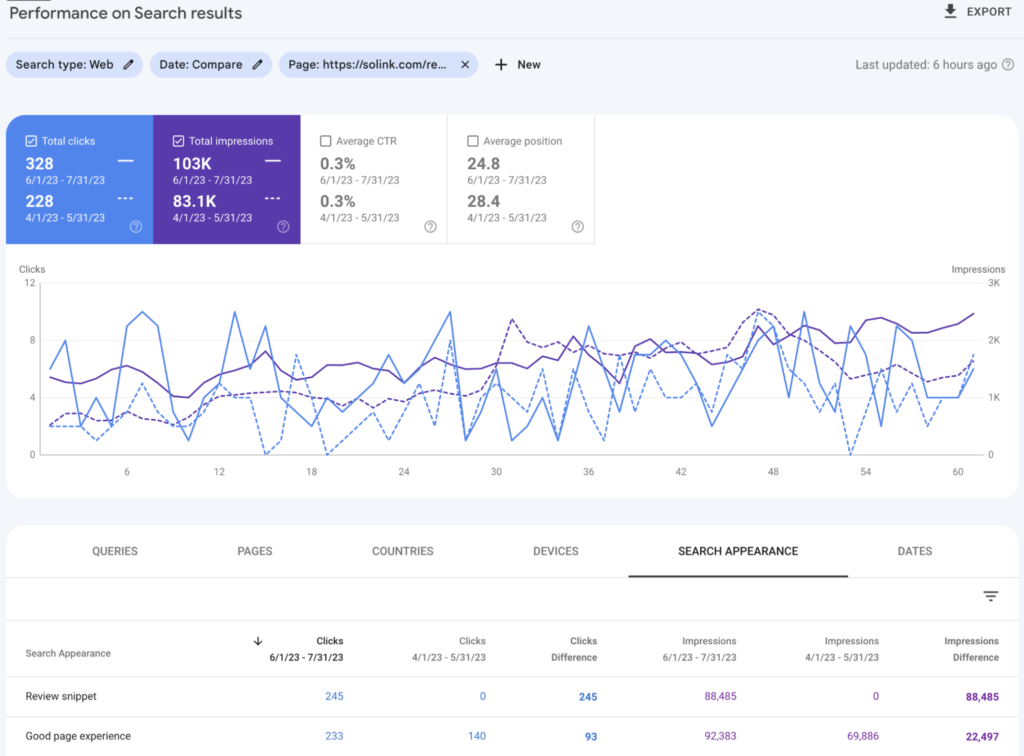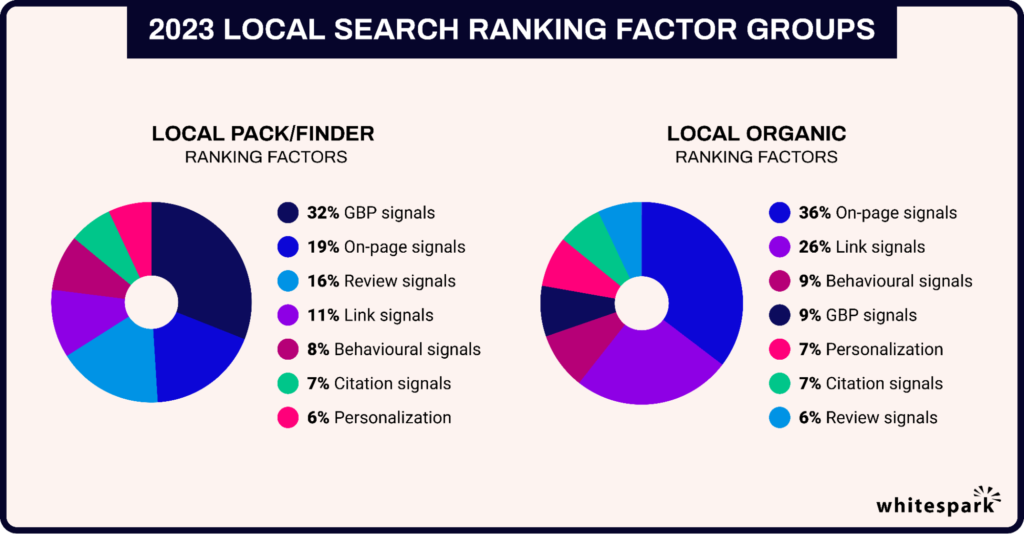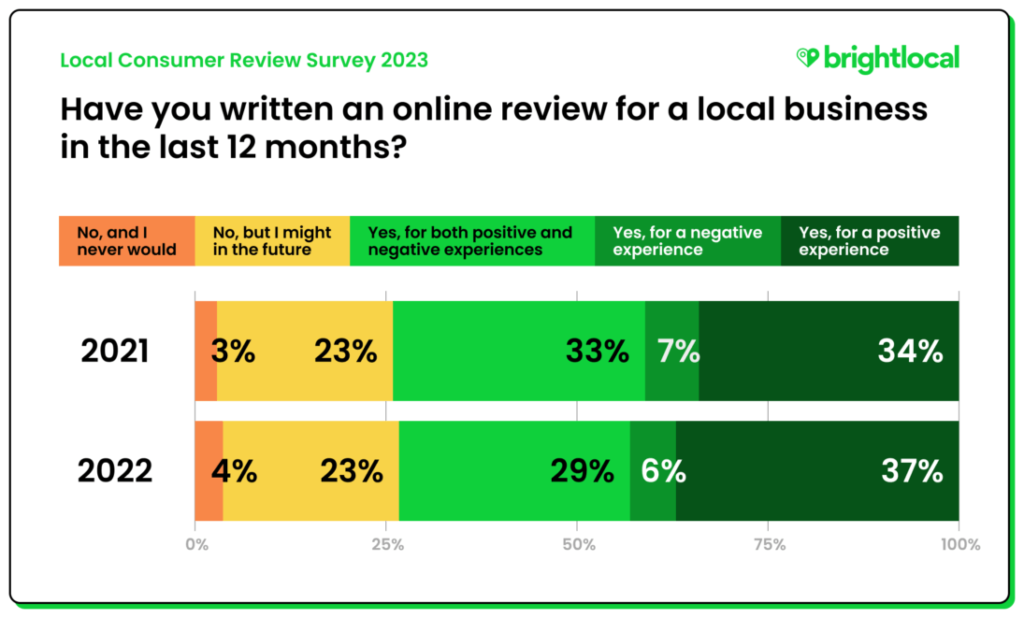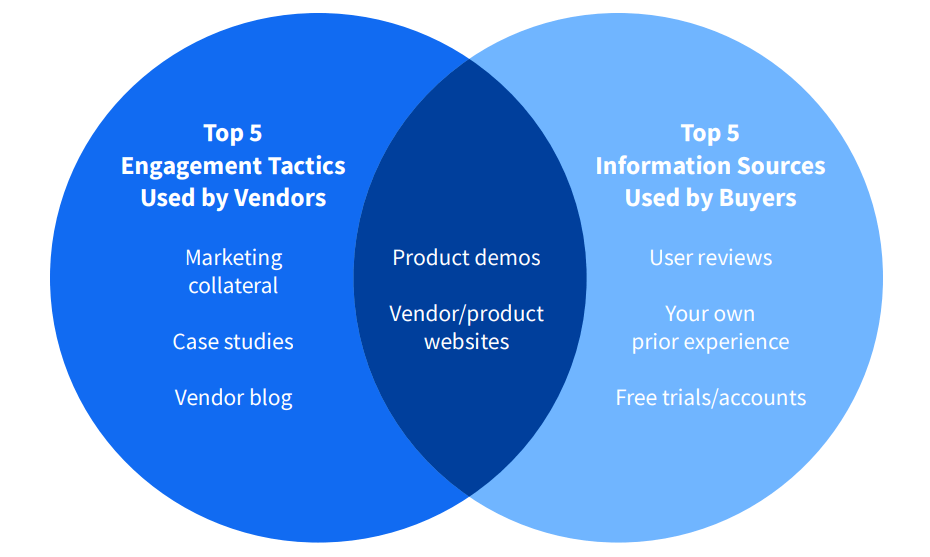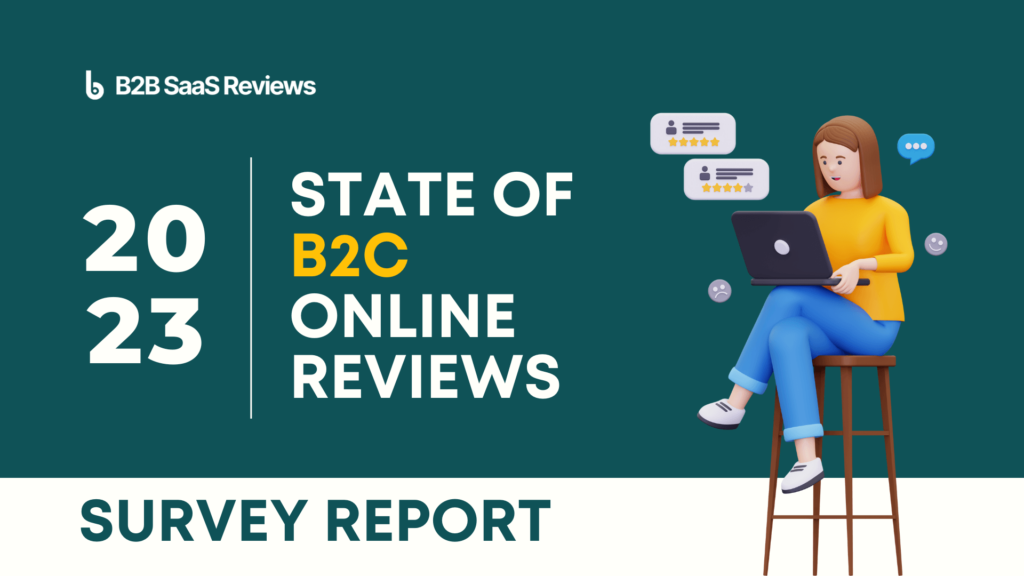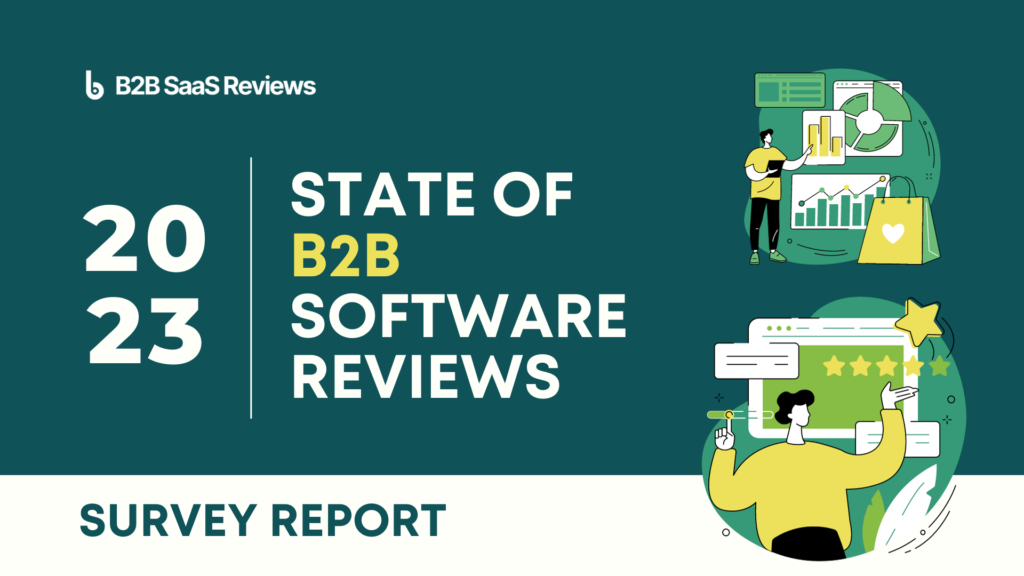Do me a favor and quickly search “online review stats”.
Here’s what you might find: A few good results, but most of the stuff you see would link back to studies done years ago. Unfortunately, like old reviews, online review stats gradually lose their merit.
If you’re a writer like me, you understand how frustrating this can be because we need hyper-relevant and recent research 24/7 (and I’m only slightly exaggerating here).
So, I took matters into my own hands and partnered with B2B SaaS Reviews to write an article containing four things:
- Original research by B2B SaaS Reviews
- Recent and relevant online review stats.
- Review statistics that mention the research methodology (wherever possible, I’ve tried to address if the information was relevant for B2B or B2C audiences).
- Links to original sources of online review statistics.
With that in mind, let’s dig into all the online review stats!
Table of Contents
Online Review Stats: Buying Journey
1. B2B buyers check review sites before making a purchase
89% of B2B buyers who use review sites say they “often” or “always” check review sites before buying any business software.
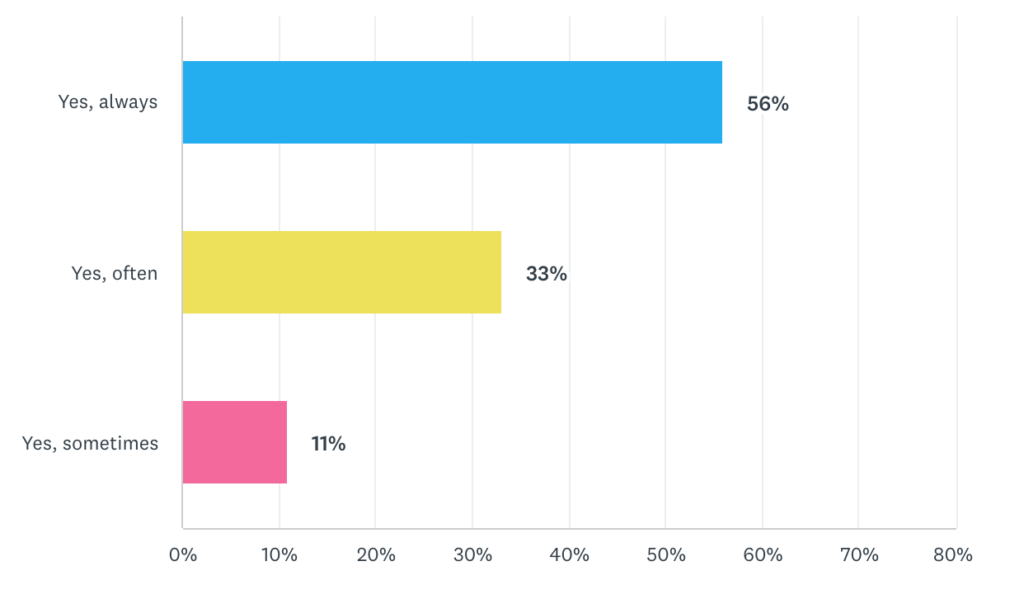
How many B2B buyers use review sites?
Clutch found that 94% of B2B buyers use online review sites to make purchase decisions. G2 found that 84% of B2B buyers use review sites for the same reason, and TrustRadius also found that 55% of B2B buyers consult online reviews to make informed purchases. While it may vary by audience, it’s safe to assume that many buyers use review sites.
And since reviews are such an important part of their buying process, I’d recommend checking out this guide to learn how to get them.
2. Consumers think online reviews are more authentic than business claims
82% of B2C consumers find online reviews more authentic and influential than marketing claims. The remaining 18% of consumers said they have the same or lesser influence.
It’s also interesting to note that while consumers found online reviews more authentic than business claims, they still would like to see more authenticity from online reviews (more on this finding later).
3. B2B buyers use reviews during all stages of the buying journey
Most B2B buyers use review sites during all stages of the buying process. Here’s a breakdown of the same:
- 64% of B2B buyers use them during the awareness stage;
- 68% use them during the consideration stage, and
- 54% use them during the decision-making stage.
As a business, you need to create a strategy that can help your buyers find the right reviews during the right time of their buying journey (e.g., consider adding review-site social proof to your email nurture sequence).
4. Both B2B and B2C customers use reviews during all buying stages
More than 50% of all review site users — in B2C and B2B — turn to online reviews throughout the buying process.
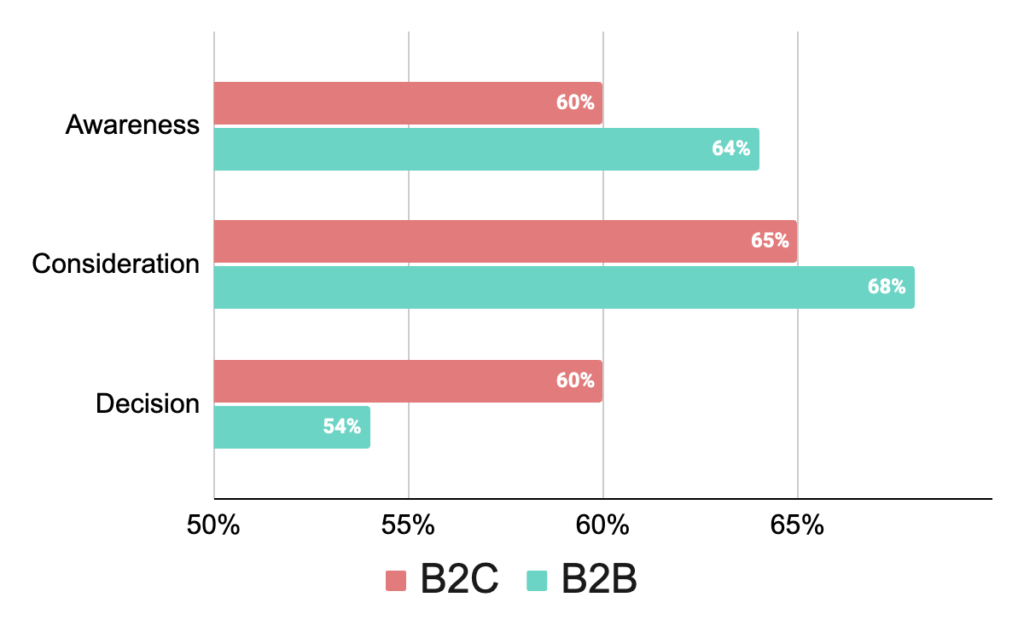
5. B2B buyers place more trust in indirect sources than directly from vendors.
B2B buyers trust indirect information sources (like peer connections, online communities, analysts, online review sites, partners, consultants, etc.) 16% more than direct information sources (like vendor marketing and sales materials).
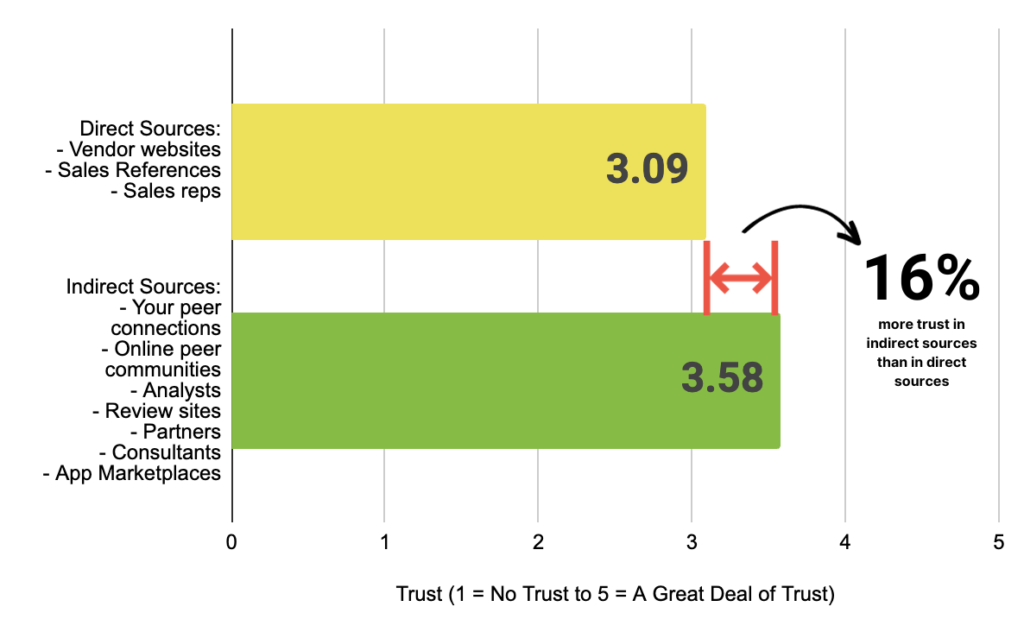
If you’re a B2B vendor, leverage the trust gap by investing in indirect sources of information.
6. Online reviews are used to increase marketplace app installs
30% of all B2B SaaS marketplaces leverage reviews as social proof to encourage app installs.
The use of online reviews on app marketplace seems to rise with company size, as 7 of the 10 largest software companies in the world with a marketplace use reviews in it.
7. Most B2B buyers list user reviews in their top three info sources
Most buyers want something tried-and-true. 61% of technology buyers in 2023 placed reviews in their most influential resources, up from 59% in 2022.
8. Online reviews are more important to shoppers than discounts and free shipping
A high online review score or rating (32.1%) is more important to B2C consumers than discounts (22.1%), loyalty points (6.5%), and free shipping (24.2%).
9. Consumers read 1-6 online reviews before purchasing
67.4% of online shoppers read between 1-6 online reviews before making a purchase decision. Fewer than 10% of shoppers are not in the habit of reading online reviews before purchasing.
10. B2B (non-tech) buyers want the abundance of reviews B2C consumers have
When asked what experiences of B2C consumers would B2B (non-technology) buyers like to see replicated, they replied:
- Faster delivery (23%)
- Easier returns (22%)
- Online reviews (20%)
11. Consumers look up user ratings online when shopping offline
85% of B2C consumers look up online ratings and reviews when shopping in-store.
12. The costlier the product, the more important reviews are
78% of all customers agree the higher the product’s price point, the more reviews they will research, which aligns with the broader buyer behavior with high-consideration purchases.
13. Online reviews are the biggest make-or-break factor in consumer purchase decisions
For B2C consumers, online reviews have the most impact on whether they decide to purchase a product.
- Customer reviews (94%)
- Product price (93%)
- Free shipping (75%)
14. Most B2B buyers read reviews of 3-5 vendors before making a purchase
56% of B2B buyers consider and read reviews of 3-5 vendors, 36% of buyers consider 6 or more vendors and only 8% consider 1 or 2 vendors.
To be considered more often, you must leverage social proof to help stand out early in your buyers’ journey.
15. Consumers mainly consider 3-5 vendors on a review site
When shortlisting vendors on review sites, 78% of B2C consumers said they would typically consider anywhere between 3-5 vendors. Only 5% would consider fewer than 3 vendors, and 17% would consider more than 5.
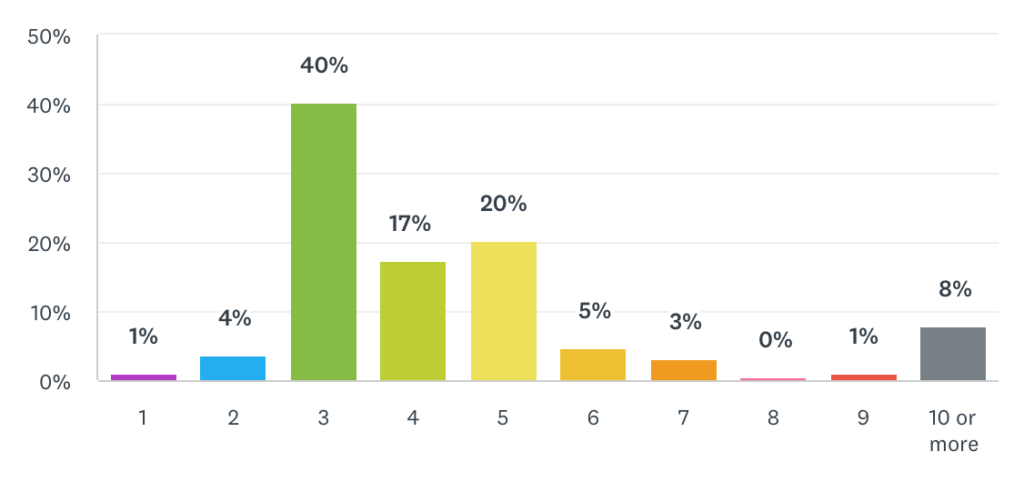
To get shortlisted early on, you’ll need to position yourself as a strong contender by amplifying online reviews that can impact a buyer’s decision-making process.
16. B2B buyers consider and research more vendors than B2C buyers
B2B buyers browse online reviews of more vendors than B2C consumers.
If we look at the graph, we realize B2C buyers shortlist an average of 4 vendors, whereas B2B buyers shortlist an average of 5.
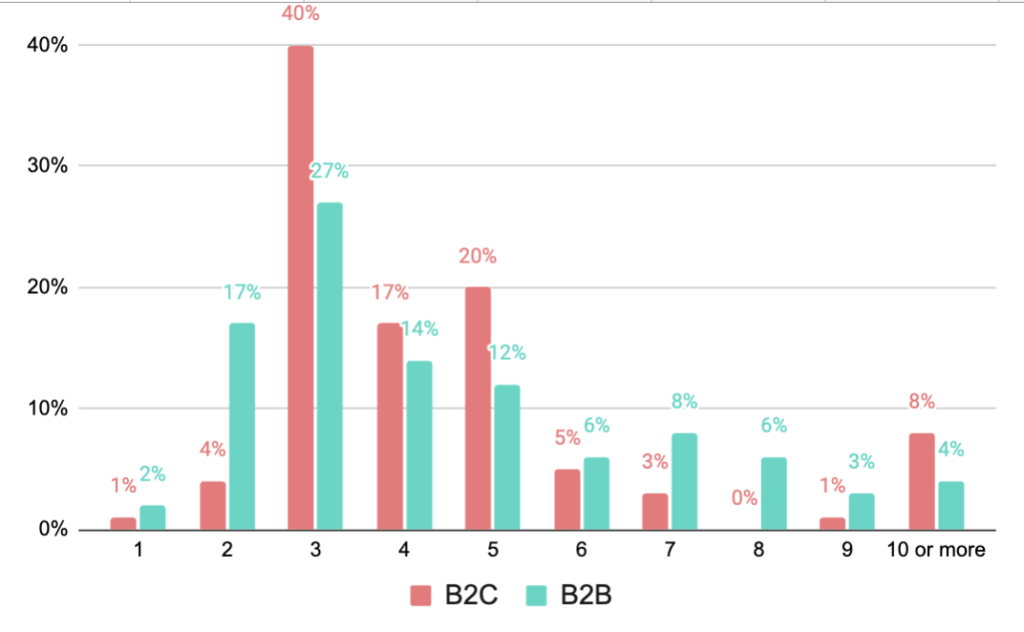
This difference is because only 17% of B2C customers consider more than 6+ vendors, whereas 27% of B2B customers consider and read reviews of 6+ vendors.
17. Bigger companies read reviews of more vendors
The bigger a company, the more software vendors they will likely consider.
For example, fewer than 45% of small businesses will consider more than 5 vendors when reading online reviews. But, over 70% of large businesses will consider and read online reviews of more than 5 vendors. Ironically, enterprises are known for purchasing the safest choice, often the category leader.
Online Review Stats: Review Sites
18. Most consumers visit online review sites to make informed decisions
77% of B2C consumers who read reviews do so to avoid making bad purchase decisions.
The rest are using them for the following reasons:
- To make informed purchases (74%)
- To know what to expect (64%)
- To learn about the pros and cons of the product/service (61%)
Today’s consumers seek customer feedback to make more informed purchase decisions.
19. In comparison to younger B2B buyers, older buyers browse fewer online review sites
Unsurprisingly, younger B2B software buyers rely more on online reviews than older buyers, who presumably are accustomed to using other, more traditional channels.
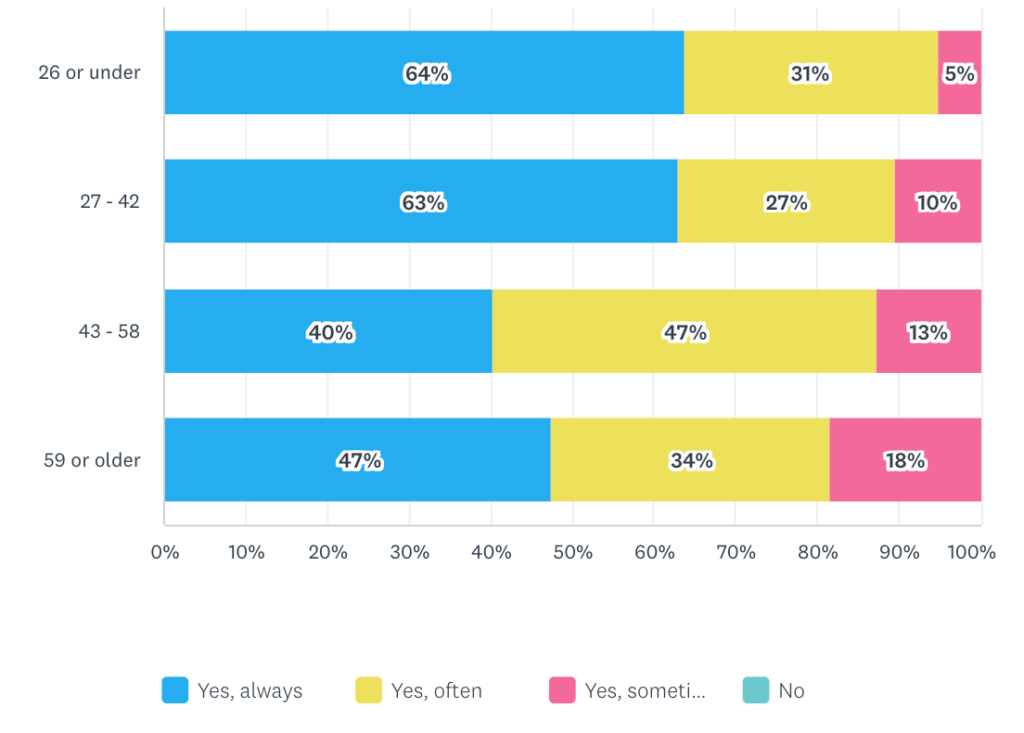
20. Buyers find a lack of authenticity the biggest issue on review sites
The #1 issue B2C consumers who use review sites have with reviews is a need for more authenticity (61%), followed by vague content (45%), skeptical scores (40%), and unrelatable scenarios (38%).
Authenticity (lack of) is also the #1 issue with online reviews for B2B software buyers, with 50% of software review site users saying it limits their use of them.
However, even with all these relevant issues, it’s important to remember that buyers still consider online reviews more authentic than business claims.
21. People who don’t visit review sites don’t trust their authenticity or rely on other resources
The main reasons why consumers don’t use review sites are:
- Reliance on other resources (37%)
- Lack of authenticity (32%)
- Trust reviews from friends and colleagues (29%)
- No trust in the scores (24%)
- Vague content or unrelatable answers (12%)
Both fans and foes of online reviews agree on one thing: there’s a lack of authenticity, which means vendors and review sites need to find better ways to encourage more authentic reviews.
22. Four business software review sites host more than five million reviews
There are 5 million online reviews in software and counting on only four business software review sites — G2, Gartner Digital Markets (GDM), Gartner Peer Insights, and TrustRadius.
23. There are more than 3 billion online reviews across consumer review sites—without accounting for Google and Facebook
There are billions of online reviews. In the B2C space alone, there are:
- 1.5 billion reviews on Amazon in 2022 alone–—that’s 45 reviews every second.
- 1 billion+ reviews on TripAdvisor (as of Feb 2022)
- 265 million reviews on Yelp (as of 2022 year-end)
- 167.5 million reviews on Trustpilot (as of 2022, according to their Transparency Report)
- 100 million+ reviews on OpenTable
- 3 million+ reviews on ConsumerAffairs
- 2.5 million verified reviews on Better Business Bureau
- 700,000 reviews on Homestars
24. Local consumers prefer responding to online review requests through emails
Local consumers are more likely to respond to online review requests if these requests are:
- Sent in an email (34%)
- Asked while making a sale (33%)
- Written on an invoice/bill (32%)
- Shared through social media (31%)
25. Ads that are co-branded with an online review site partner perform better
Trustpilot found that U.S. consumers are 65% more likely to click on an ad if it has a customer review in it. They also found that ads featuring the Trustpilot logo and stars are 2.5 times more compelling.
26. Consumers use Amazon, vendor websites, and SERP results to browse online reviews
The most popular places B2C customers browse when searching for user reviews are: Amazon (94%), websites of retailers (91%), search engine results pages [SERP] (70%), and brand websites (68%).
Online Review Stats: Buyer Trust and Perception
27. Ratings below 4.0 are considered suspiciously low by consumers
52% of consumers said if a product has an average rating of less than 4 stars, then the rating is considered “suspiciously low.”
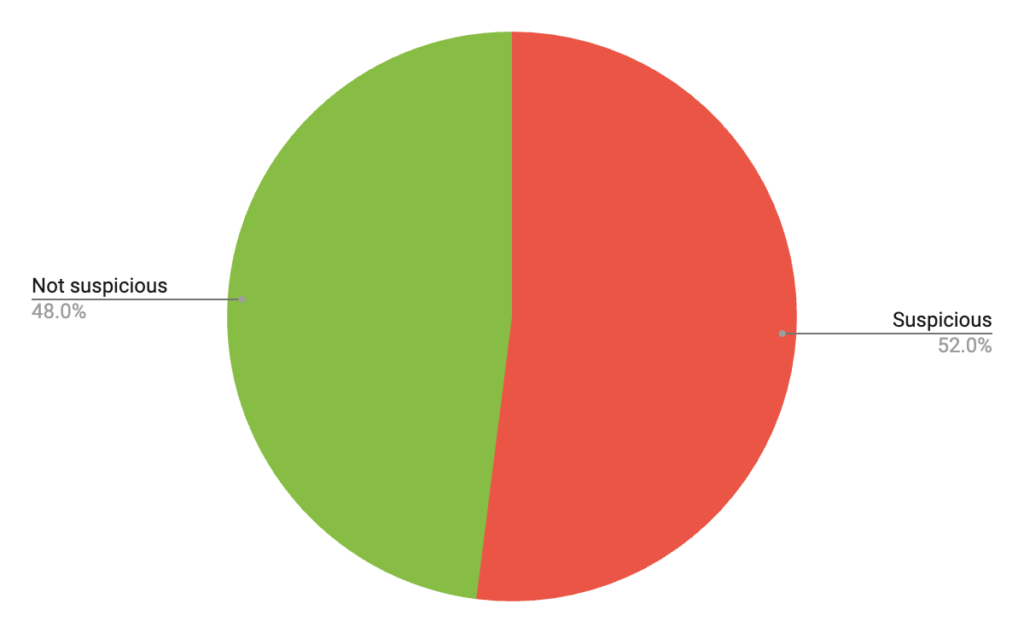
28. B2B buyers find the product’s average rating important
97% of B2B review site users agreed that a software product’s average rating is either “important” (37%) or “very important” (61%).
However, TrustRadius discovered this year that while the overall product rating is important to nearly every B2B tech buyer, they prioritize the availability of self-service information, the product’s score for specific features or attributes, the content of the review, and relatable reviewers even more.
While the overall product score is crucial, B2B buyers value certain aspects of online reviews even more. The importance of average star ratings is one of the more nuanced online review stats.
29. Products with an average review rating of less than 4.0 are not considered by many
11% of B2B buyers won’t consider vendors with an average star rating of 3.9 or lower (on a 5-star scale). The most common minimum average user rating to consider a product amongst B2B buyers is 4 stars.
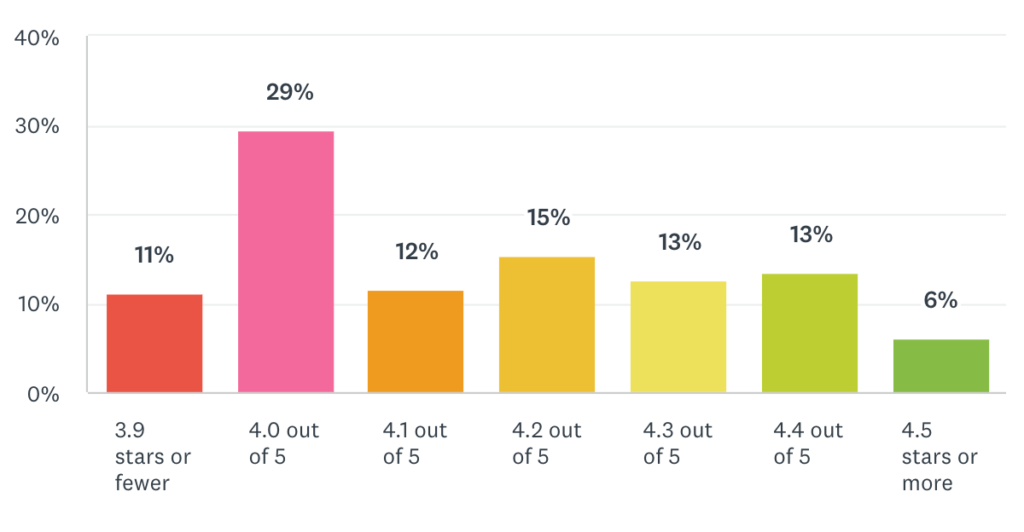
30. Over half of B2B review site users have a lot of trust in online review sites
When B2B software buyers were asked about their trust level in review sites, 52% said they trust online review sites a great deal or have a lot of trust in them.
37% of them trust review sites moderately, 10% said they have little trust in review sites, and 1% of these buyers refused to answer.
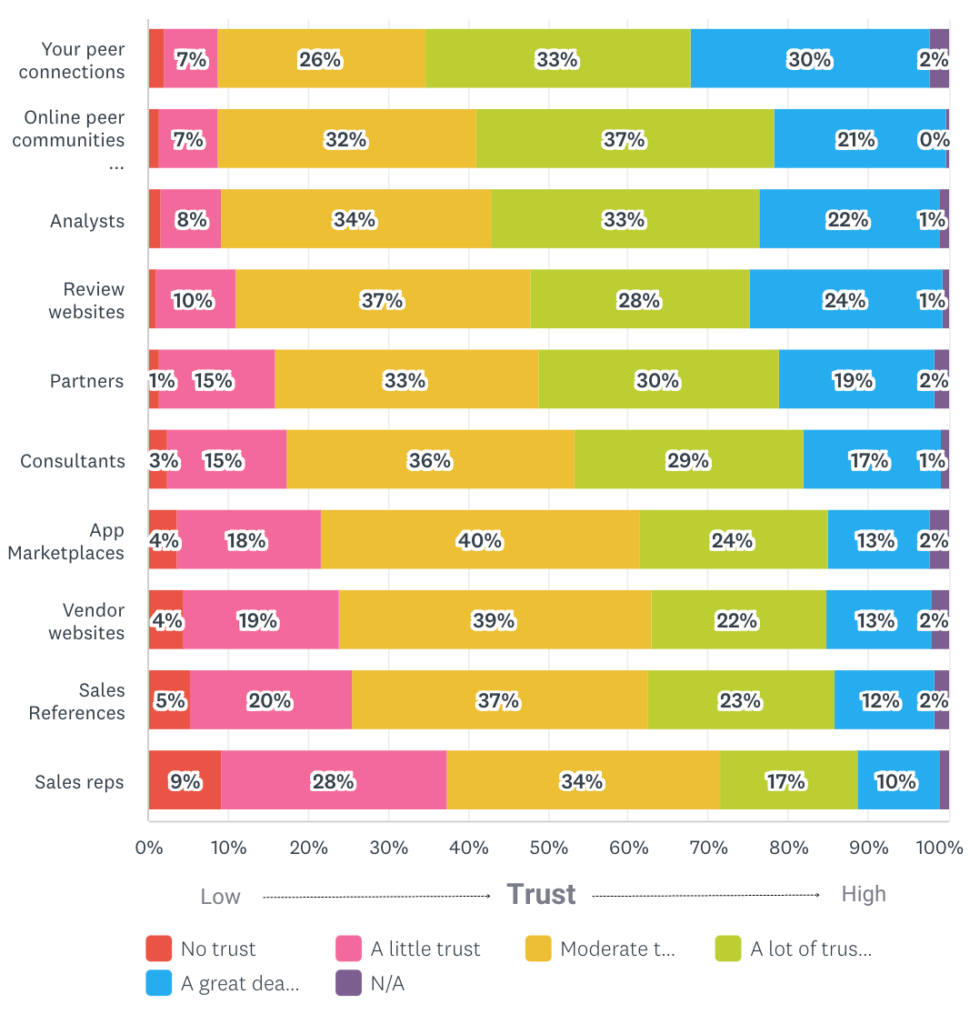
31. Larger companies more likely to use online reviews for social proof in their marketplaces
7 out of 10 of the world’s largest B2B tech companies, like Oracle, Salesforce, and Adobe, use reviews in their respective marketplaces.
However, the number drops with smaller companies. Of the 41 companies with an app marketplace on the Forbes Cloud 100 Private list (2022), only 4 use online reviews in their marketplaces.
32. Consumer products with 3,000+ reviews are 33% more attractive to shoppers
In a study by Trustpilot, if a company shows more than 3,000 customer reviews in an ad, it is considered to be 33% more compelling to buyers.
33. Reviews are the biggest influence on B2B non-software buying decisions in 2023
In 2022, B2B buyers (outside of software buyers) said that product promotion and marketing had the biggest influence on their buying decisions.
However, in 2023, the biggest influence in buying decisions was customer reviews, with 12% of all customers putting it in the top category, while only 9% of all customers put product promotion as the highest influence factor.
This study (and its subsequent findings) were unique in B2B because they considered non-software buyers and had respondents who were a part of industries like travel, beauty, food, luxury goods, automotive, manufacturing, consumer electronics, etc.
Multiple other studies that solely considered B2B software buyers found that these buyers trust personal recommendations from peers more than online reviews.
34. Online reviews and industry experts share similar importance
A study by Brightlocal states that 27% of B2C customers find customer reviews as powerful as professional reviews (i.e. reviews by influencers).
When we contrast this finding with another study from TrustRadius, we find that B2B buyers trust resources like customer reviews (54%) more than they trust professional reviews and reports by analysts (20%). However, PeerSpot found that the gap narrows significantly with enterprise buyers who have more trust in analysts (see finding below.)
35. B2B software buyers in marketing roles have more trust in their own peer research and reviews and less trust in analyst opinions than the average buyer
In a PeerSignal survey, when comparing B2B software buyers in marketing roles to buyers in all roles, marketers were 25% less likely to select analysts as their most trusted source and 17% more likely to select online reviews (G2 / TrustRadius). They’re also 2% more likely to rely on their own peer research.
This might be because some tech marketers have become jaded with the analyst process, specifically how one or two experts at the analyst firms decide how vendors are ranked in a given category. Others might work at smaller companies, which often are at a disadvantage relative to bigger companies in analyst reports.
36. Enterprise buyers are nearly 4x more likely to favor analysts than startups do
While all types of companies (regardless of their size) trust peer research more than other resources like reviews, analysts, and vendor claims, it’s worth noting that larger companies (with 5001+ employees) trust analysts like Gartner and Forrester almost 4 times as much as startups (with 1-50 employees).
37. Half of consumers will lose trust in a brand if they see fake reviews
56% of customers said they wouldn’t buy the product if they found fake reviews on a site. In comparison, 50% said they’d lose trust in the brand, 34% said they wouldn’t trust other reviews, and 25% said they wouldn’t purchase from the company itself if they saw fake reviews.
38. Consumers will travel and pay more if a company has great user reviews
58% of consumers are willing to travel farther, and 47% are willing to pay more if a business has excellent online customer reviews.
39. Consumer businesses need to have more than 50 online reviews to feel trustworthy to most buyers
22% of your customers will consider your business trustworthy if it has at least 1-10 online reviews, 26.8% would consider it trustworthy if it has at least 11-50 online reviews, and 12.9% say it doesn’t matter how many online reviews you have.
40. Consumers find recent online reviews more reliable
61% of consumers trust online reviews penned in the past 3 months more than older ones. Customers expect businesses to have recent reviews to accurately reflect the current customer experience.
41. Software buyers trust their own peer research the most
57% of software buyers place the highest trust in their own research. Meanwhile, 24% trust online review sites like G2 and TrustRadius the most, 16% prioritize analyst recommendations, and only 3% have the most faith in vendor claims.
42. Consumer businesses see a conversion lift when they get more online reviews
The more reviews your company has, the better conversion lift will see. Bazaarvoice found that websites saw a conversion lift of 136% after going from one review to 200 reviews (with steady lifts along the way). This online review stat might be the best one to demonstrate the direct positive correlation between how many reviews a vendor has and their revenue.
Online Review Stats: What Customers Want From Reviews
43. Most software buyers want online reviews to talk about product quality
B2B buyers prioritize online customer review criteria in this order: product quality (66%), ease of use (61%), cost-effectiveness (52%), security (52%), and customer support (47%).
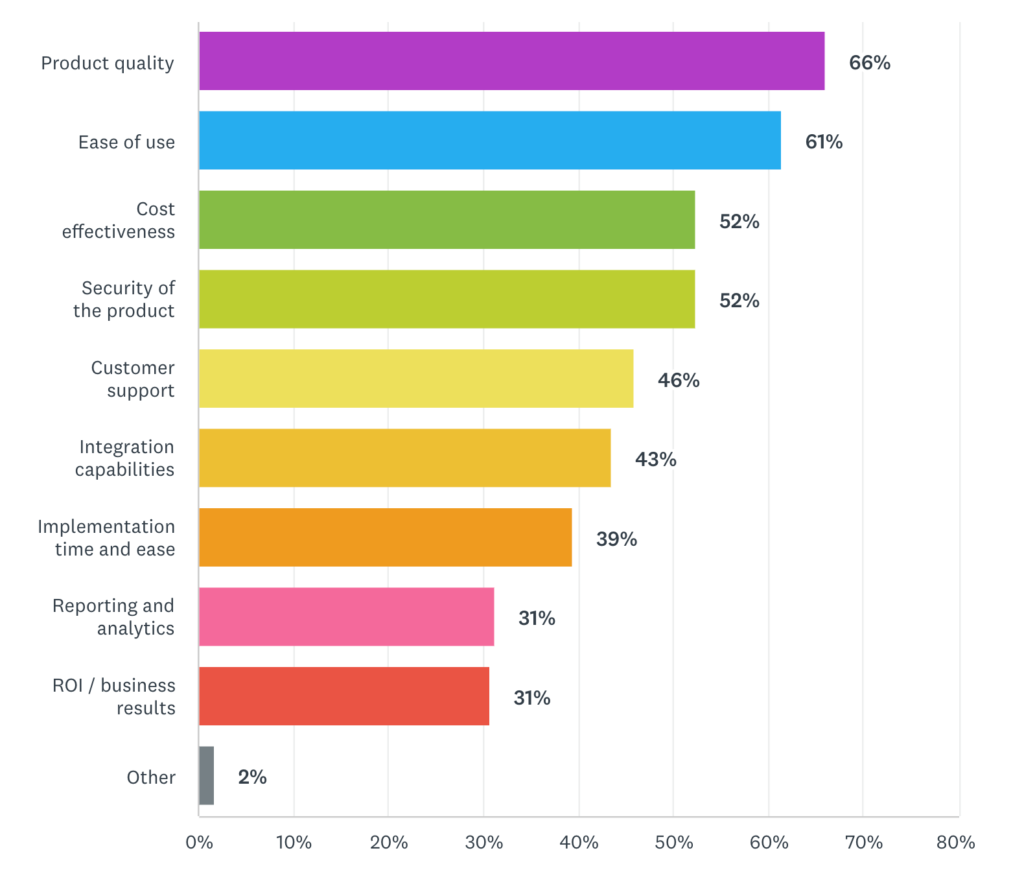
If you’re a vendor, you can use this information to know what to prioritize when leveraging social proof. You can even use these insights to craft content that showcases your product’s multi-faceted strengths.
44. Software buyers highly value a user's commentary on a product's pros and cons
52% of B2B buyers put online reviews with commentary about what the reviewer likes or dislikes about the product in their top three most important online review features.
After personal commentary, the next four most important factors in user reviews of a product are:
- Distribution of numeric ratings (e.g., higher percentage of positive reviews vs. negative reviews) (46%)
- Presence of recent reviews (39%)
- Ability to see common review themes (38%)
- Presence of numeric ratings (e.g., rated X out of 5 stars) (34%)
45. Almost half of online shoppers agree that online reviews with only a rating and no words is a red flag for a fake review
According to a survey of B2C customers of local businesses, these are the biggest red flags in consumer reviews that might lead them to think they are fake:
- Only star rating and no words (47%)
- Highly promotional in its praise (40%)
- Highly negative in its critique (32%)
- Similar content to other reviews (31%)
- Reviewer is anonymous or uses a pseudonym (30%)
- The business owner called the review fake (30%)
46. Nearly 1 in 3 B2B buyers agree that companies should apologize when responding to negative reviews
30% of B2B buyers believe a response to a negative review should be an apology. 28% say companies should respond with an explanation to negative online reviews, and 7% want companies to mention the next steps to solve the problem in the response.
See this post to learn how to respond to negative reviews.
47. B2B (non-software) buyers prefer reading online reviews over offline reviews
When asked, “What’s better – online or offline?” for ratings and reviews, 55% of buyers prefer online reviews, 34% prefer offline reviews, and 11% are indifferent. The specifics of what an offline rating and review encompass are unclear…
48. Almost all consumers value negative online reviews
85% of consumers believe negative online reviews are just as important, if not more important, than positive online reviews.
Unfortunately, it’s safe to say the typical business leader never wants to see a negative online review of their solution. This creates a point of friction between buyers and sellers on review platforms.
49. Online shoppers expect quick responses to online reviews
Most customers (72%) expect a business to respond to their online review within a week, and almost half (48%) expect a response within three days.
50. Hardly a quarter of software companies always respond to online reviews
10% of companies “rarely” or “never” respond to online reviews, whereas 33% often reply to reviews, 31% sometimes reply to reviews, and 26% always reply to reviews. Responding to reviews seems to be more common in B2C than in B2B.
51. Almost half of e-commerce online reviewers haven't had a response
Only 57% of consumers have received replies to one or more online reviews they left on e-commerce sites.
Since most customers expect prompt replies, there is an opportunity here for e-commerce vendors to meet customer demands by responding to online reviews (either to thank/apologize to reviewers or to answer any questions they might have).
52. Most customers would write a positive online review if a company resolved a negative experience
Customers are most likely to leave online reviews in the following scenarios:
- They got an excellent experience from the company (81%)
- A negative experience turned into a positive one (79%)
- The business has recently launched (73%)
53. Online shoppers want to see online reviews talk about quality, size, and service
B2C consumers use reviews to know more about product quality (81%), size/fit (66%), and customer service (65%). Also, 77% expect brands to use feedback from reviews to enhance their products.
More Online Review Stats
54. Most B2B buyers think B2B online reviews are more influential than B2C online reviews
62% of B2B respondents said they find user reviews of business software more influential than those of B2C products/services like hotels, restaurants, and Amazon products.
31% of respondents said B2B and B2C user reviews have the same influence, whereas 7% said B2C consumer reviews have more influence than B2B business software reviews.
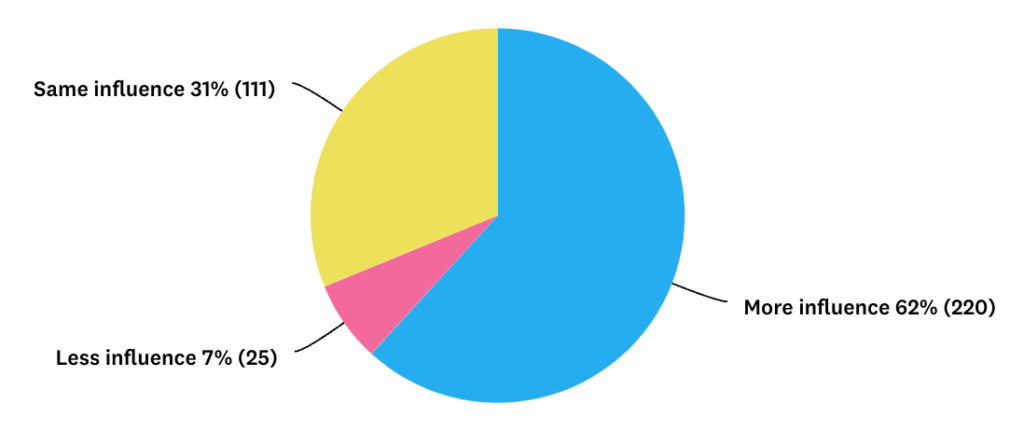
Since B2B buyers are technically B2C buyers — we’re all consumers — they have experience with online reviews in both spaces
55. Articles with online review snippets see better user engagement
The team at Solink found that articles with online review snippets see an increasing trend in clicks, impressions, and average ranking for targeted keywords.
In the first two months since adding review snippets, they saw 100 more clicks, a 44% increase compared to the previous two months.
56. B2B software buyers turn to online reviews more than any other form of content
The most compelling content for software buyers is customer reviews and ratings (41%), followed by personalized product demos (40%), user guides (39%), online training (37%), and information about customer support (36%). This is one of the most important online review stats for content marketers to note.
57. Review signals account for 16% of ranking factors for local search results
Review signals (aka first and third-party online reviews and review quantity) comprised 16% of the ranking factor Google considers when showing results.
58. Customers believe companies with fake reviews should be fined
27% of customers believed brands should be fined between 21-30% of their total revenue if found using fake reviews. Most (59%) consumers want standards to dictate that only verified customers be allowed to post reviews (as they do on the leading business software review sites.)
59. Almost all consumers would write reviews
Only 4% of buyers have never written an online review or would never consider leaving reviews (regardless of their experience).
The remaining 37% have written online reviews due to positive experiences, 6% have written them due to negative experiences, 29% have written reviews for positive and negative experiences, and 23% of customers would consider leaving online reviews in the future.
60. Most B2B review site readers claim to have written an online review
87% of B2B review site readers claim to have written a review. However, 39% say they have never or hardly ever written (1-4 times) a review on these online review sites.
61. Almost half of B2C businesses have a policy on online review management, but fewer have policies on who responds and how fast
Almost 53% of employees say their company has a review management process (which tells them what to answer and what tone and style to consider).
However, 32% said their companies have no policies on how to respond to online reviews, 18% said their companies have no policies on who responds to reviews, and 20% said there is no review management policy.
62. Negative online reviews are not the first thing that makes a B2B customer disqualify a vendor
Most B2B buyers disqualify a software provider due to:
- Mis-matched pricing expectations (41%)
- Skewed information across platforms (36%)
- Low-quality sales pitch (36%)
- No USP (35%)
- Aggressive sales tactics (35%)
- Negative online reviews (32%)
63. Fake reviews influence more than $152 billion in e-commerce purchases each year
In the grand scheme, fake reviews on e-commerce sites cost a whopping $152 billion. Just imagine how much fake and inauthentic reviews cost across all industries.
64. There's a disconnect between B2B vendor engagement tactics and buyer preferences
Technology buyers’ top five information resources are user reviews, free trials, product demos, vendor websites, and prior personal experiences. However, vendors’ top five engagement tactics do not include user reviews (or free trials/accounts.)
65. There are over 100,000 software listings on G2
According to the State of Software Report, Q4 2023, there are over 100,000 software listings on G2. With that much software, it’s no wonder why software buyers continue to turn to online reviews to get informed on their many software options.
Engage Your Buyers With Online Reviews
From this compilation of online review stats, the overarching takeaways are:
- Customers still consider online reviews a valuable information source despite their imperfect nature.
- Online reviews can help influence your brand’s perception.
- Online reviews offer multiple advantages for vendors. (B2B SaaS Reviews even wrote an entire guide on the benefits such reviews offer — click here to access this guide and learn how to leverage reviews).
To stay on top of review trends, subscribe to the B2B SaaS Reviews newsletter for the latest findings.
Authors
-

-

I'm the Founder and Editor-In-Chief of B2B SaaS Reviews and the Director of Demand Generation at PartnerStack, the leading platform for partner management and affiliate marketing in B2B SaaS. My experience spans several notable B2B SaaS companies, including Influitive (Advocate Marketing), LevelJump (Sales Enablement, acquired by Salesforce), and Eloqua (Marketing Automation, acquired by Oracle). I hold a Bachelor of Commerce in Marketing Management from Toronto Metropolitan University and a Master of International Business from Queen's University, with academic exchanges at Copenhagen Business School and Bocconi University.

